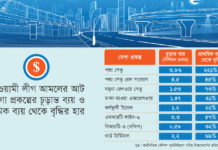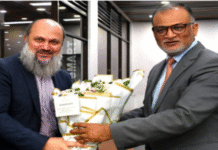Victims of the August 21, 2004 grenade attack on an Awami League rally and the victim families still cry for justice as two cases for the attack are still pending with a tribunal while the plotters are yet to be identified.
Prosecutors in 2016 said that the trial of the two cases might be concluded in three months but after one year they now said it would take few more weeks.
The defence counsels, however, had been arguing that there should not have any timeframe for trial for the sake of justice.
The Speedy Trial Tribunal-1 judge, Shahed Nuruddin, recorded testimonies of 225 of the 491 prosecution witnesses, mostly serving or retired government officials.
The tribunal also examined the accused citing the charges and evidences the witnesses testified against individual accused in the cases.
The tribunal is now recording the testimonies of defence witnesses.
Additional chief prosecutor Musharraf Hossain Kajol, who had said last year that they were trying to conclude the trail in three months, said on Saturday that they made many progress in the past one year and hoped that a few more week would take to complete the proceedings.
Defence counsel Parvez Hossain alleged that the state mechanism was harassing the accused and even their lawyers.
At least three Supreme Court lawyers defending accused in the cases already stopped attending the trial proceedings to avoid further troubles, defence counsels alleged seeking anonymity.
Parvez and another defence counsel Muhammad Ali languished in jail for 40 days in 2015 for giving legal assistance to the accused, they alleged.
Twenty four people, including late president Zillur Rahman’s wife Ivy Rahman, were killed and over 200 were injured in the grenade attack on a rally of the then main opposition Bangladesh Awami League in front of its central office at Bangabandhu Avenue on August 21, 2004.
Awami League president Sheikh Hasina, now the prime minister, among others, escaped the attack but the explosions caused her hearing damage.
Two cases––one for the murder and the other under the Explosive Substances Act––were filed for the grenade attack while a judicial inquiry was also conducted.
The one-member judicial inquiry commission of Justice Joynul Abedin, formed on August 22, 2004, submitted its report to the home ministry on October 2, 2004 with 14 short- and seven long-term recommendations.
‘The commission has not been able to identify the actual culprits,’ the report said, ‘but it has nevertheless been able to identify the masterminds behind the incident.’
The government had also sought help from the US Federal Bureau of Investigation and the Interpol but their findings had never been made public.
The course for the investigation into, and the story about, the grenade attack had been changed time and again with the changes in the state power.
The Criminal Investigation Department had arrested 20 people and allegedly forced George Miah, Abul Hasem Rana and Shafiqul Islam to confess to the attack in 2005.
In the statement, George Miah, a man from Noakhali, reportedly said that a team of 14 took part in the attack being instructed by top crime suspects Tanvirul Islam Joy and Subrata Bain, reportedly hiding in India, and the 14, including George, was paid Tk 5,000 each for the attack.
The investigation into the two cases took a new turn after the military-controlled interim regime took over the power on January 11, 2007 with Harkat-ul-Jihad-al-Islami operations commander Mufti Abdul Hannan, arrested on October 1, 2005 in connection with the Ramna Batamul blast, making a statement before a magistrate on November 1, 2007.
On June 9, 2008, CID pressed charges against former BNP deputy minister Abdus Salam Pintu, Mufti Abdul Hannan and 20 others in the cases.
After recording testimonies of 61 prosecution witnesses, the tribunal on August 3, 2009 ordered further investigations into the cases following petitions filed by the prosecution after the Awami League assumed power.
On July 3, 2011, CID submitted supplementary charge sheets against 30 more people including Bangladesh Nationalist Party chairperson Khaleda Zia’s eldest son Tarique Rahman, former BNP state minister for home Lutfozzaman Babar, political secretary to prime minister during Khaleda Zia’s 2001-2006 tenure Abul Harris Chowdhury and the then Jamaat-e-Islami secretary general Ali Ahsan Mohammad Mojaheed.
On March 18, 2012, the tribunal charged the 30, in addition to the 22 people indicted earlier, in the cases.
Of the 52 accused, 22 are in jail and 8 are on bail.
Mojaheed was dropped from the trial as he was hanged at Dhaka Central Jail on November 22, 2015 on charge of crimes against humanity committed during the 1971 War for Independence.
Abdul Hannan Munshi and Sharif Shahedul Alam Bipul were also dropped from the cases following their executions on April 12, 2017 on charge of killing three people and injuring former British high commissioner in Bangladesh and dozen others in Sylhet.
The rest 18 accused, including Tarique, are being tried in their absence.
CID special superintendent Abdul Kahar Akand, who was promoted to additional deputy inspector general, said that they sought Interpol assistance for bringing back four accused––Tarique Rahman, now in London, former BNP lawmaker Shah Mofazzal Hossain Kaikobad, believed to be in Bangkok, Maulana Taj Uddin, now in South Africa, and Harris Chowdhury, whose whereabouts was still unknown.
He said that they were trying to determine the whereabouts of the rest 14 accused, including Hanif Enterprise owner Mohammad Hanif, the then Directorate General of Forces Intelligence director ATM Amin, who was later promoted to major general, and the then DGFI general staff officer-1 Saiful Islam Joarder, now retired.
In October 2016, Bangladesh requested South Africa to expedite the process of extradition of Maulana Tajuddin, reportedly now in South Africa.
State minister for foreign affairs Shahriar Alam made the request during a meeting with South African deputy minister of international relations and cooperation Nomaindiya Mfeketo in Bali in Indonesia, according to a foreign ministry release.
Awami League leaders in political programmes continued alleging that their arch-rival Bangladesh Nationalist Party top leaders were behind the attack.
The prime minister, Sheikh Hasina, in August 2016 alleged that BNP chairperson Khaleda Zia had wanted to eliminate her through the grenade attack.
Indicating Khaleda’s eldest son Tarique Rahman’s involvement in the grenade attack, Hasina alleged that he hatched the conspiracy at his father-in-law’s house at Dhanmondi 5 staying there for 8-10 months and returned home on August 21, 2004.
BNP secretary general Mirza Fakhrul Islam Alamgir, however, termed August 21 massacre as a barbaric act of violence and said that BNP never supported this barbaric attack.
The victims and victim families expressed their disappointment with the delay in the trial and said that the ‘actual plotters’ must be identified and brought to justice.
‘It’s really disappointing as the trial took too much time,’ said Mahbuba Parvin, a victim still living with splinters in her body she sustained in the attack.
Mahbuba, also-vice president of the Dhaka district unit of Awami Swechchhasebak League, said, ‘I want their punishment before I die.’
Source: New Age









